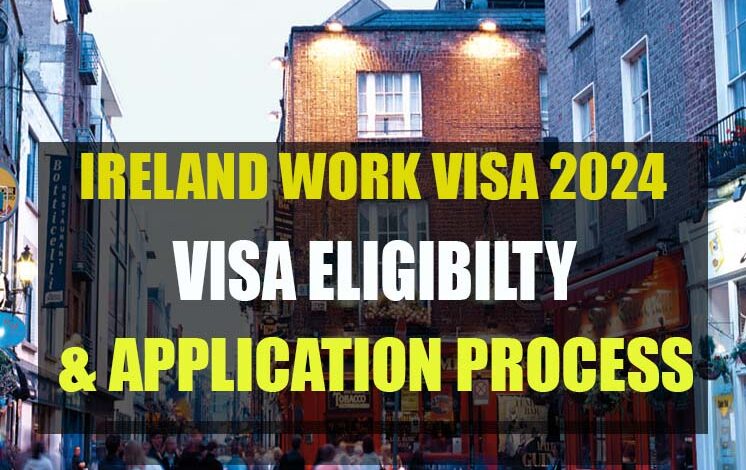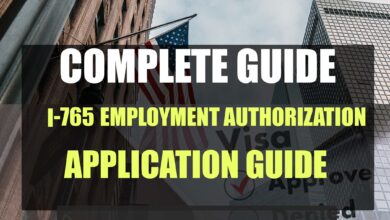Ireland Work Visa 2024: Visa Eligibility & Application Process

Ireland Work Visa 2024: Visa Eligibility & Application Process
Professionals from the EU and outside looking for well-paying jobs and a simple visa application process are increasingly choosing Ireland as their destination. Ireland has a flourishing economy, with plenty of chances for professional progression and excellent compensation, especially in the tech, banking, and pharmaceutical industries.
Lucrative career opportunities abound as major multinational corporations like Google and Pfizer have established their European headquarters in locations like Dublin. Furthermore, professionals seeking to progress their careers find Ireland to be a desirable location due to its high standard of living and advantageous tax regulations.
The nation’s reduced visa requirements add to its allure. With simple application processes and encouraging policies, the General Employment Permit (GEP) and Critical Skills Employment Permit offer non-EU people clear routes to employment in Ireland. These licenses facilitate job mobility and family reunion in addition to making the migration procedure simpler.
When combined with its first-rate educational system, warm society, and rich cultural legacy, Ireland becomes an attractive destination for global talent seeking a stimulating and fulfilling work environment.
The General Employment Permit (GEP) in Ireland serves as an essential channel for attracting foreign talent, with the dual goals of filling skill shortages in the local labor market and giving companies access to a larger candidate pool. Knowing the nuances of the GEP is crucial, whether you’re thinking about employing foreign talent or are considering Ireland as your next career location.
Purpose of the General Employment Permit
To alleviate labor shortages across a range of industries and promote economic growth, the GEP is intended to draw in talented individuals from non-EU/EEA nations. In addition to upholding equitable employment practices and protecting regional labor markets, it guarantees that companies can locate the talent they require if local applicants are not accessible.
Eligibility Criteria
Several prerequisites must be satisfied to be eligible for the GEP:
- Work must not be on the Ineligible List of Occupations for Employment Permits for the job to qualify.
- Labor Market Needs Test: To demonstrate that they were unable to find an EEA citizen to fill the post, the employer must have performed a Labor Market Needs Test.
- Minimum Salary: The position must pay a minimum of €30,000 per year, with certain exceptions for newly graduated employees and those in particular occupations.
- Requirements: The candidate must meet the requirements in terms of education, training, and work experience.
- Employer: The employer needs to be registered with the Companies Registration Office and Revenue as well as be in business in Ireland.
- 50/50 Rule: The EEA must account for more than 50% of the company’s current workforce.
Application Process
The GEP application process is simplified, yet it still needs close attention to detail:
- Prepare Documentation: Gather all required paperwork, such as your passport, offer of employment, certification, and proof of passing the Labour Market Needs Test.
- Apply Online: The Employment Permit Online System (EPOS) can be used to submit applications online at https://epos.enterprise.gov.ie. The system walks you through every step and makes sure you fulfill all the requirements.
- Processing: The order in which applications are received is examined. If more information is needed, it needs to be sent in within 28 days. Though decision-making periods can vary, they usually take a few months.
- Approval and Registration: To obtain your Irish Residence Permit (IRP) (https://www.irishimmigration.ie/registering-your-immigration-permission/information-on-registering/irish-residence-permit/), you must register with the Irish Naturalization and Immigration Service (INIS) within 30 days of receiving approval.
Ireland GEP Work Permit Fees
A general employment permit’s price is determined by how long it is valid for:
- Up to 6 months: €500
- Up to 24 months: €1,000
Higher renewal fees apply; they are €750 for the first six months and €1,500 for the first thirty-six. 90% of the application fee is returned if it is not accepted.
Bringing Family
You can apply to bring your family to Ireland once you’ve had a GEP for a full year. Every family member needs a visa, and you have to demonstrate that you make enough money to support them.
Changing Jobs in Ireland Following GEP Acquiring
GEP holders are first required to work for their first employer for a full year. After this time, if all requirements are satisfied, they can apply for a new GEP and change employers.
The General Employment Permit in Ireland is a strong framework that strikes a compromise between the requirements of foreign professionals and enterprises. It gives talented workers a clear way to support the Irish economy while giving firms and employees opportunities and rights. Gaining an understanding of the GEP’s procedures and requirements is essential to making the most of this opportunity.
Read On
New Rules for Working Hours for International Students in Canada
Canada Unveils New Work Permit Program in 2024 | Canada Work Permit
Australia 4 Years Work Visa in 2024: Complete Guide
Canada Open Work Permit 2024: Easy Access to Working in Canada
Belgium Working Holiday Visa: Complete Application Process
Steps to Obtain a 5-Year Work Visa for Finland in 2024: Complete Guide
Italian Work Visa Process 2024: Complete Guide & Application Process
US EB3 Work Visa 2024: Complete Guide & Application Process
Kuwait Unveils New Work Permit System in 2024: Full Details
Japan Working Visa 2024: Visa Types, Requirements & Application Process
Ireland Work Visa 2024: Visa Eligibility & Application Process
Hungary Work Visa 2024: Visa Types, Eligibility Criteria & Application Process
Belgium Seasonal Work Permit 2024: Complete Application Process



